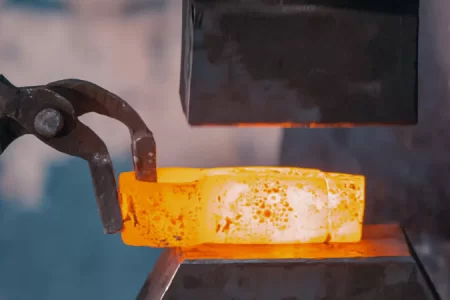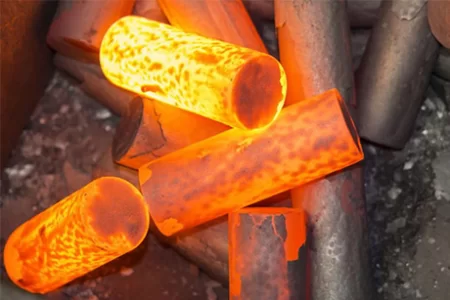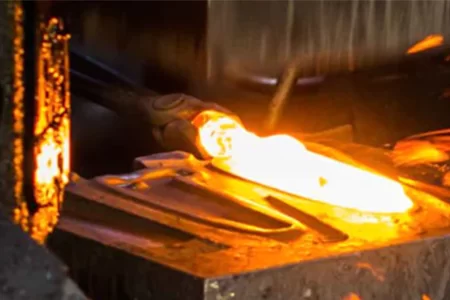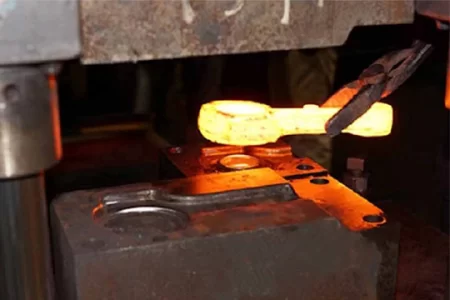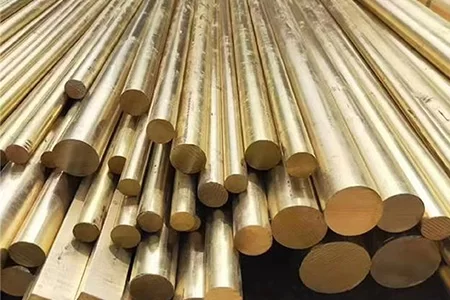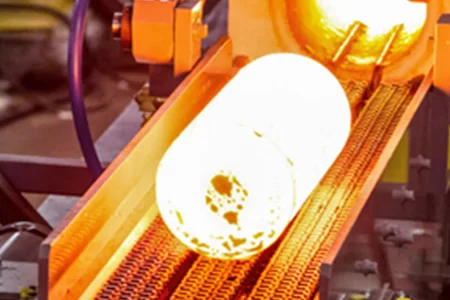By sharing knowledge, experience and views in the field of forging technology, we help you understand, learn and apply relevant technologies.

Hulk Metal Forging Technology
Share technical experience
-
Home>
-
Blog>
-
Technology>
In-depth analysis of hot forging surface treatment process

In the hot forging industry, the surface treatment process, as one of the key technologies, directly affects the service life, wear resistance, corrosion resistance, and overall performance of forgings. Through scientific and reasonable surface treatment, forgings can show excellent mechanical properties and long-term stability in different application scenarios. This article will analyze in detail the process types, technical principles, material properties, and applications of hot forging surface treatment in actual production, and explore future development trends.
Importance of hot forging surface treatment
With the continuous improvement of product performance requirements in the industrial field, the importance of hot forging surface treatment has become increasingly prominent. Surface treatment can not only make up for problems such as surface roughness and oxidation during the hot forging process but also greatly improve the performance indicators of forgings, as shown below:
Improve wear resistance
The surface treatment process enhances the hardness of the forging surface through hardening or plating technology so that it has a longer service life in a high-load wear environment.
Enhance fatigue resistance
Mechanical strengthening processes such as shot peening can introduce residual compressive stress, effectively slow down the expansion of fatigue cracks, and improve the fatigue resistance of parts.
Improve corrosion resistance
Electroplating, chemical plating, and anti-corrosion coating can effectively isolate corrosive media and reduce the erosion effect of the external environment on forgings, especially suitable for marine, chemical, and high-humidity environments.
Improve surface roughness
Through rolling treatment and coating technology, the surface roughness can be significantly reduced, which is conducive to reducing friction and improving the assembly quality of parts.
Extend service life
Comprehensive surface hardening, strengthening, and protection measures can comprehensively improve the mechanical properties and stability of forgings, significantly extend service life, and reduce maintenance costs.
Common hot forging surface treatment processes
Heat treatment and chemical heat treatment
Carburizing treatment
Carburizing is the most common surface hardening process, usually used for low-carbon steel and low-alloy steel materials. By heating the forging in a carburizing medium controlled by carbon potential, carbon atoms diffuse into the metal surface to form a high carbon content surface layer. Finally, through quenching hardening, high hardness martensite is formed on the surface, while the core still maintains toughness, with excellent impact and wear resistance.
Application scenarios: suitable for parts that are subject to high impact and high wear, such as gears, drive shafts, cams, etc.
Nitriding treatment
The nitriding process heats the metal in a nitrogen potential environment to diffuse nitrogen atoms into the metal surface, forming a nitride layer with extremely high hardness. Compared with carburizing, the nitriding treatment temperature is lower and less likely to cause deformation, which is particularly suitable for high-precision parts.
Advantages: The nitriding layer has good wear resistance, strong corrosion resistance, and small surface deformation.
Application scenarios: molds, cylinder liners, precision mechanical parts, etc.
Boriding treatment
Boriding is a process in which boron atoms diffuse into the metal surface to form a boride layer, which has extremely high hardness and wear resistance.
Application scenarios: parts in high-wear environments, such as wear-resistant parts of mining machinery.
Mechanical surface strengthening treatment
Shot peening treatment
Shot peening forms a compressive stress field by ejecting steel shots at high speed to impact the forging surface. Shot peening can not only improve the surface hardness but also improve the fatigue performance and crack propagation resistance of the parts.
Advantages: Improve fatigue strength and delay surface crack propagation.
Application scenarios: trailer accessories, mining machinery, and other high-fatigue working parts.
Rolling treatment
Rolling treatment is a surface cold processing process. It applies pressure to the surface of the forging by mechanical rolling tools to densify the surface structure, reduce surface roughness, and enhance surface fatigue resistance.
Electroplating and chemical plating process
Electroplating
Electroplating is a process of depositing a metal or alloy layer on the surface of the forging by electrolysis to form a coating with protective and decorative effects. Common electroplating includes:
Galvanizing: significant anti-rust effect.
Chromium plating: improves surface hardness and wear resistance.
Nickel plating: enhances corrosion resistance and decorative properties.
Application areas: automotive parts, connectors, fasteners, etc.
Chemical plating
Chemical plating does not require external current and relies on chemical reactions to evenly deposit metal on the surface of the workpiece. It is particularly suitable for complex structural parts.
Surface coating and thermal spraying technology
Thermal spraying
Thermal spraying is a high-temperature surface treatment technology. The molten coating material is sprayed onto the surface of the workpiece through a high-speed airflow to form a dense coating with strong bonding.
Process type: flame spraying, plasma spraying, high-velocity oxygen spraying (HVOF).
Advantages: A coating with wear resistance, heat resistance, and corrosion resistance can be formed on the surface.
Application areas: wind power, petrochemicals, aviation parts, etc.
Anti-corrosion coating
By applying anti-corrosion coating, external corrosive media can be effectively blocked and the life of parts can be extended.
Quality control of the surface treatment process
Pre-treatment
Pre-treatment is a key step in determining the effect of surface treatment, mainly including degreasing, rust removal, pickling, phosphating, sandblasting, and other processes to ensure that the surface of forgings is clean and free of impurities.
Process parameter control
Precise control of temperature, time, and penetration depth.
Inspection of surface bonding and tissue density.
Testing and evaluation
Hardness testing, metallographic microscopic analysis, salt spray test, coating thickness detection, and other methods are used to ensure that product quality meets standard requirements.
Why choose HULK Metal as your OEM forging factory in China?
In the increasingly competitive manufacturing industry, choosing a professional and reliable OEM forging factory is crucial. It not only determines the quality and performance of the product but also directly affects the competitiveness and brand reputation of the enterprise in the market. As a professional hot forging factory with many years of experience, advanced technology, and strong production capacity, HULK Metal has become the preferred OEM forging supplier for many companies around the world with its excellent process, strict quality control, perfect service system, and high flexibility. The following are the core advantages of choosing HULK Metal:
Strong production capacity and technical strength
HULK Metal has advanced production equipment, including 3-axis, 4-axis, and 5-axis milling centers, the latest CNC lathes and turning centers, and precision hot die forging equipment, which can meet the customized needs of various complex forgings. Our production process covers a variety of technical paths such as hot die forging, precision forging, free forging, etc., which are suitable for a variety of materials, such as carbon steel, alloy steel, stainless steel, etc., to ensure that the product has excellent performance and stability in different application scenarios.
In addition, HULK Metal has a team of experienced engineers and technical experts who can provide a full range of solutions from product design, and process optimization to mass production according to customer needs. We are committed to providing customers with cost-effective customized forging products through continuous technological innovation.
Strict quality control system
Quality is the lifeline of a forging factory. HULK Metal strictly implements the ISO 9001 quality management system in the production process and has passed international authoritative certifications such as CE, TUV, and SGS. Our quality control system runs through every link of production, from the selection of raw materials to the monitoring of the production process, and then to the final inspection of finished products, all in strict accordance with international standards.
Specifically:
· Raw material inspection: Select high-quality steel to ensure that the chemical composition and mechanical properties of the material meet the standards.
· Production process monitoring: Through advanced automated testing equipment, real-time monitoring of key process parameters such as forging temperature, forging pressure, and mold accuracy.
· Finished product inspection: Use hardness testing, tensile testing, non-destructive testing, dimensional accuracy testing, and other methods to ensure that each product meets customer requirements.
· Third-party certification: Cooperate with authoritative third-party testing agencies to issue professional test reports to ensure the high reliability of product quality.
We always adhere to the quality goal of "zero defects" to ensure that every forging delivered to customers can meet or even exceed expectations in terms of performance and durability.
Customized and flexible production services
HULK Metal is well aware that customer needs are diverse and constantly changing, so we provide highly flexible OEM services, supporting small-batch trial production to large-volume customized production to meet the needs of customers of different sizes and industries. We maintain close communication with customers and fully understand their design concepts and application requirements, from early technical consultation, and product design to later mass production and delivery, to ensure efficient project advancement and shorten delivery cycles.
Our professional engineering team can also provide process optimization and cost control suggestions to help customers effectively reduce production costs while ensuring product quality, and further improve market competitiveness.
Perfect surface treatment and subsequent processing capabilities
As a professional hot forging factory, HULK Metal also provides one-stop surface treatment and subsequent processing services, including sandblasting, heat treatment, galvanizing, chemical plating, oxidation treatment, spraying, and other processes to meet customers' different needs for product appearance, performance and protection requirements. Through professional surface treatment, we can significantly improve the fatigue resistance, corrosion resistance, and appearance quality of forgings, extend the service life of products, and help customers win a better reputation in the market.
Perfect logistics system and global supply chain
With more than 20 years of cooperation experience with international logistics companies, HULK Metal can provide customers with efficient and economical transportation solutions and support fast delivery around the world. Our flexible logistics management system can customize the best transportation method according to customer needs to ensure the safe and timely delivery of products. In addition, we also support a variety of packaging methods, including export standard packaging and customized packaging solutions to protect the safety of products during transportation.
High-quality customer service and after-sales support
Customer satisfaction is the goal that HULK Metal constantly pursues. We have established a perfect customer service system, equipped with professional pre-sales, in-sales, and after-sales teams, which can quickly respond to customer needs and solve problems that may arise during production and delivery. In addition, we also provide customers with technical support, quality tracking, and long-term after-sales service to ensure that customers use our products without worries.
The surface treatment process of hot forgings is the core technology to improve product performance and market competitiveness. Through scientific and reasonable process selection and precision control, the performance, life, and reliability of forgings will reach new heights. In the future, with the rapid development of environmental protection and intelligent technology, hot forging surface treatment technology will usher in innovative breakthroughs and provide better solutions for the global industry.
Article Navigation
Article Navigation
Industries
Foundries
-

July.01, 2024
Difference between hot forging and cold forging
READ MORE
-

June.27, 2024
What are the advantages and disadvantages of the hot forging process?
READ MORE
-

January.18, 2024
Forging: What Is It? What Are The Different Types of Hot Forging?
READ MORE
-

November.29, 2024
What is steel forging?
READ MORE
-

July.30, 2024
What are the materials for hot forging?
READ MORE
-

July.03, 2024
What are the processes of hot forging?
READ MORE



